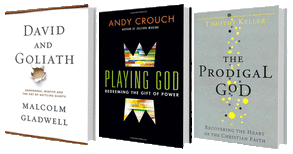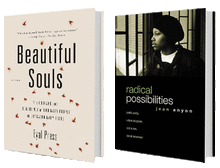
(Gladwell, 2013, p. 6).
This statement drives to the heart of the message that Malcolm Gladwell’s new volume aims to explore. Even those with no religious affiliation will recognize the namesake of the title – we hear it referred to when a lower seeded sports team is battling an opponent, when a lesser known politician defeats an incumbent, and when a whistleblower has the audacity to confront a major corporation. In David and Goliath: Underdogs, Misfits, and the Art of Battling Giants, Gladwell makes use of his characteristic style to once again turn the table on common misconceptions. He uses research from studies in a variety of disciplines such as psychology, sociology, and criminology to illustrate his central thesis that being and acting as an underdog can have surprising power and uncommon results.
In this review, instead of dissecting Gladwell’s thesis and critiquing the strengths and weaknesses, I’m going to focus on a chapter that I find particularly poignant and that I think has ramifications for our work in our organizations. In Chapter 8, Gladwell tells a story of forgiveness and in it he outlines with grace how forgiveness can turn “turn the world upside down”. Of particular interest to me, and probably to my readers is that even outside of his intentional use of Biblical allusion there is a subtle and discernible Christian element at the foundation of Gladwell’s most recent volume. I won’t spend time exploring that here, but this isn’t surprising given his background and what he has been saying in recent interviews. More information can be found in an interview linked to in the footnotes about Gladwell’s faith journey.[1]
In Chapter 8, Gladwell uses the stories of two characters to foil one another. The first is the story of a man named Mike Reynolds who was the instigator behind the enacting of the Three Strikes Law in California. Essentially, the Three Strikes law mandated subsequently stiffer penalties for repeat offenders. The third offence could land an offender in jail for 25-to-life. Three Strikes had a rationale for Mike Reynolds; he lost his daughter to a senseless murder in 1992 - Kimber Reynolds was shot to death outside of a Fresno Planet Hollywood for what appeared to be no reason. Mr. Reynold’s ensuing life mission became vengeance for his murdered daughter.
Behind Reynold’s vision for prevention of criminal activity lies a view of humans as homo economicus which describes people as rational decision makers who make intentional choices based on conscious cost-benefit analyses. This is misguided, Gladwell claims. While attacking the Three Strikes law and critiquing Reynold’s approach Gladwell shows us that much to the contrary criminals often act spontaneously with very little forethought. What’s worse, the Three Strikes law was shown to be enormously expensive, largely ineffective at preventing criminal activity, and guilty of incarcerating an inordinate number of young males. Three Strikes culminated in being popularly characterized by the story of a three time offender being incarcerated in the same cell as a murderer for stealing a piece of pizza. And, it consumed the rest of Reynold’s life.
The story of Three Strikes is juxtaposed against a story of forgiveness. Candace Derksen was a Winnipeg youngster who was murdered senselessly. The reaction of her mother Wilma was, however, quite different than that of Mike Reynolds. In a word, Wilma chose forgiveness. She could very well have pursued vengeance. She could have chosen to avenge her daughter’s murder by pursuing a lifelong quest to bring justice to her daughter’s name in the way of activism and advocacy. Wilma Derksen admits, though, that this would only have been easier in the beginning. She concedes that “it would have gotten harder. I think I would have lost [my husband], I think I would have lost my children”. Ultimately, she says “In some ways I would be doing to others what he [the murderer] did to Candace” (p. 261).
The two stories offer drastically different ways of viewing the world, drastically different ways of approaching and responding to situations of adversity. Gladwell concludes the chapter by summarizing Derksen’s response: “A woman who walks away from the promise of power finds the strength to forgive – and saves her friendship, her marriage, and her sanity. The world is turned upside down” (p. 262, italics mine). It is this last two-fold point that I want to focus on for the rest of this article. First, forgiveness is powerful and power-full, and second when forgiveness is chosen power is turned upside down.
“Giants are not what we think they are, the same qualities that appear to give them strength are often the sources of great weakness”.
What is it about forgiveness that is so difficult? Have you ever been in a situation where you know that you simply need to forgive someone to move on but are unable to do so? Have you ever been in a situation where you know that you need forgiveness but you’re unable to say two seemingly simple words? ‘I’m sorry’ is perhaps the hardest phrase in the English language to utter. Why?
Tim Keller in Prodigal God: Recovering the Heart of the Christian Faith offers a reason. He claims that “forgiveness is free and unconditional to the perpetrator, but it is costly to you” (Keller, 2009, p. 83). Forgiveness is costly because we give up something in the process; we give up our right to vengeance, our right to make things right in our favour. Consider the options: If someone damages your car, you can demand that they cover the cost of the repair or replacement, or you can cover the cost yourself. In essence you can choose to forgive the cost (we’ll conveniently ignore insurance companies in this example). Forgiveness always comes at a cost and that cost is giving up your specious right to power over the situation.
Power considered in this way can be regarded as Gladwell’s giant. The same qualities that give this power its strength can also become its greatness weakness. What happens in the extreme when we pursue our right to vengeance, our right to compensation, our right to make things right? In Mike Reynolds case he plunged his state and other parts of the country into a set of ineffective, inefficient, and possibly unjust laws while denying himself closure. On the contrary, what happens when the right to vengeance and compensation are given up? For Wilma Derksen, she was able to maintain her closest relationships and she could experience some semblance of closure.
My use of the word power is of course simplified here and limited to one context. Andy Crouch in his most recent book “Playing God: Redeeming the Gift of Power” explores power more fully. Tucked in the back half of the book he makes an interesting statement regarding power, forgiveness, and institutions. He prophesies that “the institutions of our time will be changed not by impersonal institutional forces; they will be changed by trustees, the image bearers who face their institutions failings, forgive them and lead toward a better way” (Crouch, 2013, p. 220).
What does it mean to forgive an institution and how does this relate to our discussion of forgiveness and power thus far? All institutions fail and fall short. Just as individuals of which institutions are composed fail and fall short, so too institutions will corporately neglect their God-given mandate at times. Will leaders, lay or professional, react by engaging their right to vengeance, compensation, and right to make things right? Or, will they bear the cost themselves? The latter, I think, is more in line with what our God-given calling is as leaders. We know that we must acknowledge the failings, but forgiving the failings is deeper than that. Forgiving is also not about forgetting. We must remember our failings in order to ensure that the same failings don’t needlessly happen again. Rather, forgiving our failings means acknowledging them, confessing them, and ultimately finding new and faithful ways forward.
Failing is a giant. What appears to give it its strength is also its greatest weakness. Failing has the façade of being able to hold us down, to prevent us from growth, development, and improvement. When failing is forgiven, however, its strength is redeemed and it will help us and our organizations to grow, develop, improve, and ultimately flourish.
Works Cited
Crouch, A. (2013). Playing God: redeeming the gift of power. Downer's Grove, IL: InterVarsity Press.
Gladwell, M. (2013). David and Goliath: underdogs, misfits, and the art of battling giants. New York: Little Brown & Company.
Keller, T. J. (2009). The prodigal god: recovering the heart of the Christian faith. London: Hodder & Stoughton.
[1] http://www.religionnews.com/2013/10/09/interview-malcolm-gladwell-return-faith-writing-david-goliath/


 RSS Feed
RSS Feed
